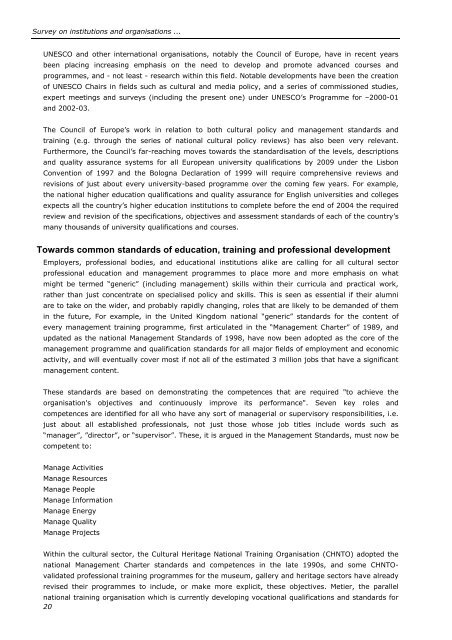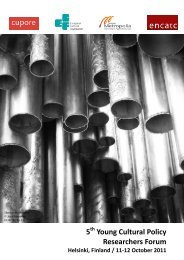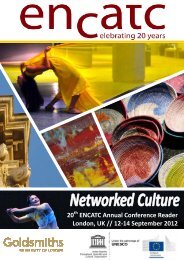Training in cultural policy and management: international ... - Encatc
Training in cultural policy and management: international ... - Encatc
Training in cultural policy and management: international ... - Encatc
You also want an ePaper? Increase the reach of your titles
YUMPU automatically turns print PDFs into web optimized ePapers that Google loves.
Survey on <strong>in</strong>stitutions <strong>and</strong> organisations ...<br />
UNESCO <strong>and</strong> other <strong>in</strong>ternational organisations, notably the Council of Europe, have <strong>in</strong> recent years<br />
been plac<strong>in</strong>g <strong>in</strong>creas<strong>in</strong>g emphasis on the need to develop <strong>and</strong> promote advanced courses <strong>and</strong><br />
programmes, <strong>and</strong> - not least - research with<strong>in</strong> this field. Notable developments have been the creation<br />
of UNESCO Chairs <strong>in</strong> fields such as <strong>cultural</strong> <strong>and</strong> media <strong>policy</strong>, <strong>and</strong> a series of commissioned studies,<br />
expert meet<strong>in</strong>gs <strong>and</strong> surveys (<strong>in</strong>clud<strong>in</strong>g the present one) under UNESCO’s Programme for –2000-01<br />
<strong>and</strong> 2002-03.<br />
The Council of Europe’s work <strong>in</strong> relation to both <strong>cultural</strong> <strong>policy</strong> <strong>and</strong> <strong>management</strong> st<strong>and</strong>ards <strong>and</strong><br />
tra<strong>in</strong><strong>in</strong>g (e.g. through the series of national <strong>cultural</strong> <strong>policy</strong> reviews) has also been very relevant.<br />
Furthermore, the Council’s far-reach<strong>in</strong>g moves towards the st<strong>and</strong>ardisation of the levels, descriptions<br />
<strong>and</strong> quality assurance systems for all European university qualifications by 2009 under the Lisbon<br />
Convention of 1997 <strong>and</strong> the Bologna Declaration of 1999 will require comprehensive reviews <strong>and</strong><br />
revisions of just about every university-based programme over the com<strong>in</strong>g few years. For example,<br />
the national higher education qualifications <strong>and</strong> quality assurance for English universities <strong>and</strong> colleges<br />
expects all the country’s higher education <strong>in</strong>stitutions to complete before the end of 2004 the required<br />
review <strong>and</strong> revision of the specifications, objectives <strong>and</strong> assessment st<strong>and</strong>ards of each of the country’s<br />
many thous<strong>and</strong>s of university qualifications <strong>and</strong> courses.<br />
Towards common st<strong>and</strong>ards of education, tra<strong>in</strong><strong>in</strong>g <strong>and</strong> professional development<br />
Employers, professional bodies, <strong>and</strong> educational <strong>in</strong>stitutions alike are call<strong>in</strong>g for all <strong>cultural</strong> sector<br />
professional education <strong>and</strong> <strong>management</strong> programmes to place more <strong>and</strong> more emphasis on what<br />
might be termed “generic” (<strong>in</strong>clud<strong>in</strong>g <strong>management</strong>) skills with<strong>in</strong> their curricula <strong>and</strong> practical work,<br />
rather than just concentrate on specialised <strong>policy</strong> <strong>and</strong> skills. This is seen as essential if their alumni<br />
are to take on the wider, <strong>and</strong> probably rapidly chang<strong>in</strong>g, roles that are likely to be dem<strong>and</strong>ed of them<br />
<strong>in</strong> the future, For example, <strong>in</strong> the United K<strong>in</strong>gdom national “generic” st<strong>and</strong>ards for the content of<br />
every <strong>management</strong> tra<strong>in</strong><strong>in</strong>g programme, first articulated <strong>in</strong> the “Management Charter” of 1989, <strong>and</strong><br />
updated as the national Management St<strong>and</strong>ards of 1998, have now been adopted as the core of the<br />
<strong>management</strong> programme <strong>and</strong> qualification st<strong>and</strong>ards for all major fields of employment <strong>and</strong> economic<br />
activity, <strong>and</strong> will eventually cover most if not all of the estimated 3 million jobs that have a significant<br />
<strong>management</strong> content.<br />
These st<strong>and</strong>ards are based on demonstrat<strong>in</strong>g the competences that are required "to achieve the<br />
organisation's objectives <strong>and</strong> cont<strong>in</strong>uously improve its performance". Seven key roles <strong>and</strong><br />
competences are identified for all who have any sort of managerial or supervisory responsibilities, i.e.<br />
just about all established professionals, not just those whose job titles <strong>in</strong>clude words such as<br />
“manager”, ”director”, or “supervisor”. These, it is argued <strong>in</strong> the Management St<strong>and</strong>ards, must now be<br />
competent to:<br />
Manage Activities<br />
Manage Resources<br />
Manage People<br />
Manage Information<br />
Manage Energy<br />
Manage Quality<br />
Manage Projects<br />
With<strong>in</strong> the <strong>cultural</strong> sector, the Cultural Heritage National <strong>Tra<strong>in</strong><strong>in</strong>g</strong> Organisation (CHNTO) adopted the<br />
national Management Charter st<strong>and</strong>ards <strong>and</strong> competences <strong>in</strong> the late 1990s, <strong>and</strong> some CHNTOvalidated<br />
professional tra<strong>in</strong><strong>in</strong>g programmes for the museum, gallery <strong>and</strong> heritage sectors have already<br />
revised their programmes to <strong>in</strong>clude, or make more explicit, these objectives. Metier, the parallel<br />
national tra<strong>in</strong><strong>in</strong>g organisation which is currently develop<strong>in</strong>g vocational qualifications <strong>and</strong> st<strong>and</strong>ards for<br />
20






